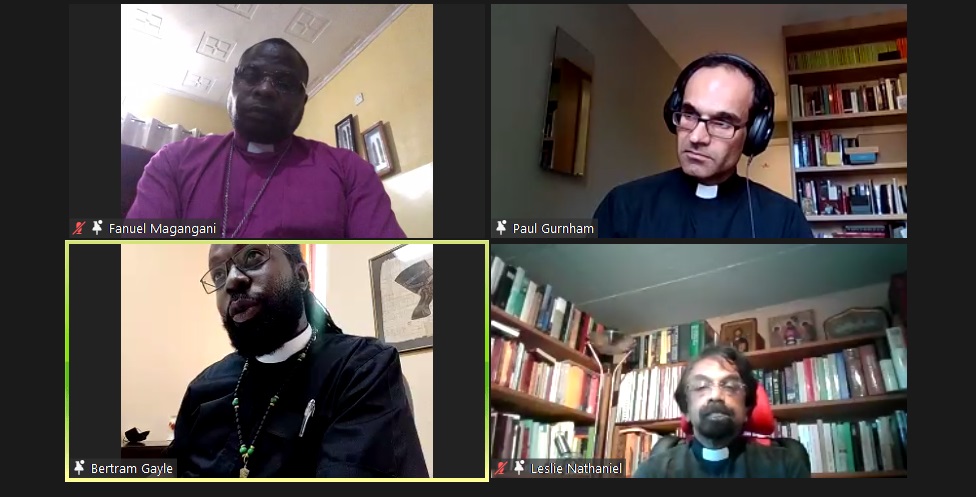Racial Justice: Recovering Spiritualities, Restoring Justice

The third session of the USPG conference focused on the theme of Racial Justice: Recovering Spiritualities, Restoring Justice.
The session began with a special message from the Most Rev’d Howard Gregory, Archbishop of the Church in the Province of the West Indies. Archbishop Gregory said, “The topic of racial justice is of utmost importance and should be at the centre of the relationship and dialogue between USPG, the Church in the Province of the West Indies and churches across the Anglican Communion”.
Worship for this session was provided by the Diocese of Belize’s youth group, who blessed the conference with wonderful music and a traditional dance routine.
The Rev’d Augustine Tanner-Ihm, Assistant Planting Curate and Minister of Inclusion and Mission at St James and Emmanuel church in the Diocese of Manchester, led the session in a Bible study, focusing on the story of Zacchaeus the tax collector in Luke 19. Rev’d Tanner-Ihm said, “We live together in a diverse and broken world. What does the Gospel of Luke have to say to Christians today? In the Gospel of Luke, the spotlight is shone on the marginalised. The story of Zacchaeus is messy – here is a man who is complicit in the systemic injustices carried out by the Roman Empire. Yet, upon meeting Jesus, Zacchaeus recognises his own sin and vows to give half of his wealth to the poor”. Rev’d Tanner-Ihm asked attendees a series of questions about the Bible passage, including “What was it that moved Zacchaeus to change his ways? Can you think of times when you have been complicit in systemic racism? What would Zacchaeus’ repentance look like in your own context? What does a world without racism look like to you, and what can you change to bring this about?”
The Most Rev’d Hosam Naoum, Archbishop in Jerusalem, added that “Racial injustice is an issue that we are dealing with in the Middle East through prayer and understanding, seeking to understand God’s will for us in the here and now. The story of Zacchaeus reminds us of the transformation we need to see in our own communities, as well as in countries across the Anglican Communion. In the Province of Jerusalem and the Middle East, we continue to protect historic sites which feature in stories such as the one we have heard today – these sites remind us of God’s justice and the love He gave to us through Christ”.
The Rev’d Bertram Gayle, Ordinand in the Diocese of Jamaica and the Cayman Islands, highlighted the need for the Church in Jamaica to develop its own culture in place of the colonial legacy it inherited. He said, “Whilst the disestablishment of the Church in Jamaica took place over 150 years ago, this brought about change in governance rather than culture. The disestablished Church continued the traditional approach to Church championed by colonial powers rather than encouraging the flourishing of indigenous activities such as pan drumming and the incorporation of local language into the liturgy. An engagement with local culture would be an exercise in justice, involving a people and culture that has historically been misunderstood. We need to show the Jamaican people that we value their identities and that we value their contributions as Anglicans in Jamaica”.
The Venerable Dr Leslie Nathaniel, Archdeacon of the East, Germany and Northern Europe, spoke about the Diocese in Europe’s response to racial injustice in the form of their policy paper, Breathing Life. The Venerable Dr Nathaniel quoted from this paper, saying, “Church is renewed from the edges, rather than the middle – there is nothing more edgy than the hill of Calvary". He added, "racial injustice in the church context is seen in the glaring under-representation and exclusion of people of colour in decision-making processes. We must move from exclusion to inclusion”.
The Rt Rev'd Fanuel Mangangani, Bishop of Northern Malawi, spoke about his experience in the Anglican Church of Malawi, which has successfully developed its own distinct culture. He said, “Many in the Church of Malawi see the arrival of the Universities’ Mission to Africa as a gift rather than a burden. The success of this mission is partly due to the participation of indigenous Africans in mission organisations, which allowed missionaries to better understand local religions and inculturate Christianity into this context. This process involved translating hymns and liturgy into languages such as Chichewa. The development of faith in our specific context leads us to celebrate our distinct identity as the Anglican Church of Malawi.
Attendees asked questions regarding the limitations of inculturation, the indigenisation of the Church and the intergenerational nature of fighting racial injustice.
Speakers included: Rev’d Augustine Tanner-Ihm, Assistant Planting Curate and Minister of Inclusion and Mission at St James and Emmanuel Church in the Diocese of Manchester, Bertram Gayle, Ordinand in the Anglican Diocese of Jamaica and The Cayman Islands, Venerable Dr Leslie Nathaniel, Archdeacon of the East, Germany and Northern Europe, and the Rt Rev'd Fanuel Magangani, Bishop of the Diocese of Northern Malawi.
To read about the other conference sessions and to watch the recordings visit the links below.
Solidarity and global mission in the Age of Covid
Prayer, Presence and Provision in the Pandemic
The Cry of Creation: Creativity in the Church
